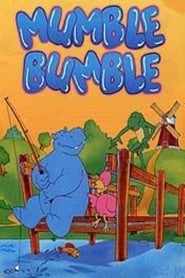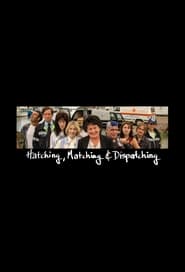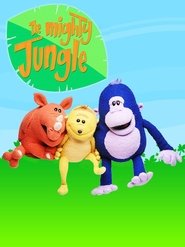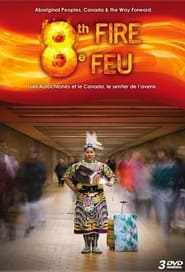Cbc Television TV Series - Page 17
-
Mumble Bumble
0000
Mumble Bumble
0000
Mumble Bumble is a 67 x five-minute co-production between Egmont Imagination and Cinar. It follows the adventures of an imaginative blue hippopotamus and his best friends, Chic'o, the inquisitive chicken, and Greens, the busy frog who never looks before he leaps. The idea, which is designed to be both educational and entertaining for a preschool audience, was devised by an architect called Christian Skjott. In Canada it was broadcast on CBC Television. -
The Real Magees
0000
The Real Magees
0000
The Real Magees was a Canadian talk show television series which aired on CBC Television in 1973. -
Do It For Yourself
1982
Do It For Yourself
1982
Do It for Yourself is a Canadian television home improvement series hosted by Mary Bellows. It first premiered on CBC on September 13, 1982. The series ended on December 1, 1983 with 278 episodes. The program was one of the top run daytime shows in Canada and was sold in 1985 to a broadcast group which then aired the series on USA network, Lifetime and PBS in the United States. -
Evil By Design: Surviving Nygård
2022
star 7.5The story of accused sexual predator Peter Nygard and the women who survived his decades-long reign of evil. -
Hits a Poppin
0000
Hits a Poppin
0000
Hits a Poppin was a Canadian music television series which aired on CBC Television in 1968. -
Juliette and Friends
1973
Juliette and Friends
1973
Juliette and Friends is a Canadian talk show television series which aired on CBC Television from 1973 to 1975, daily at 2pm. -
Summerscope
1980
Summerscope
1980
Summerscope is a Canadian current affairs television series which aired on CBC Television in 1980. -
Outlook
0000
Outlook
0000
Outlook is a Canadian short film television series which aired on CBC Television in 1966. -
Hatching, Matching and Dispatching
0000
star 3Hatching, Matching and Dispatching was a Canadian television sitcom series. The CBC Television show starred Mary Walsh as Mamie Lou Furey, the matriarch of a family in Newfoundland and Labrador who owns a combination ambulance, wedding and funeral business. The remaining cast included Shaun Majumder, Mark McKinney, Rick Boland, Joel Thomas Hynes, Jonny Harris and Susan Kent. Hynes and Walsh were also writers for the series, along with Sherry White, Ed Macdonald and Adriana Maggs. The series pilot aired January 17, 2005 as one of three CBC sitcom prototypes which included Getting Along Famously and Walter Ego. The CBC employed a viewer response poll to gauge interest in these pilots, a technique previously employed with the shows Rideau Hall and An American in Canada. Hatching, Matching and Dispatching began shooting its first season of six episodes on July 18, 2005 and began airing as a regular series on January 6, 2006 with six episodes, following a rebroadcast of the original pilot on December 30, 2005. The epi -
Rock Camp
2004
Rock Camp
2004
Rock Camp was a 13-episode Canadian reality television series of 2004. Episodes featured 18 youths training to become rock musicians, as filmed in Halifax, Nova Scotia. The series was first broadcast 5 April 2004. -
Pirates: Adventures in Art
0000
star 8Pirates: Adventures in Art is a Canadian animated children's television show produced by DHX Media. The Creative Producer and Executive Story Editor for the show is award-winner Jed MacKay, and is produced by Katrina Walsh. Its theme song is sung by multi-award-winning Canadian band Great Big Sea. -
The Mighty Jungle
2007
star 10The Mighty Jungle is a puppet series for preschoolers in which the narrative of the story is largely crafted by a group of preschoolers who appear in live-action segments interspersed between puppet-acted scenes. It is co-produced by Halifax Film and Decode Entertainment, both DHX Media Companies; it is produced in association with CBC Television. The program is broadcast in Canada on CBC Television, a Canadian television network owned by the Canadian Broadcasting Corporation, the national English-language public broadcaster, in the Kids' CBC programming block, and in the United States on the PBS Kids Sprout cable network. -
Haunted Studio
0000
Haunted Studio
0000
Haunted Studio was a Canadian music variety television series which aired on CBC Television in 1954. -
Dr. Zonk and the Zunkins
0000
Dr. Zonk and the Zunkins was a CBC children's television series which ran three afternoons a week from 23 September 1974 to 14 April 1975. Although the show was cancelled after one season, it was notable for the number of cast members who went on to successful careers. Some of the cast members were also seen in the following season on the CBC Television series Coming Up Rosie. -
The Great War
2007
The Great War
2007
The Great War is a CBC television film documenting Canadian participation in the First World War. The film stars Justin Trudeau and was shown on Canadian television during the 90th Anniversary of the Vimy Ridge battle, airing in two parts on April 8 and April 9, 2007. The Fox website included the following notice seeking people to participate in the making of the film: Did your great-grandfather take Vimy Ridge? Did he play a part in the three-month battle at Passchendaele? Did he break through the German line at Amiens? For a landmark film to mark the 90th anniversary of the First World War, the CBC is recruiting 300 descendants of those who went to war between 1914 and 1918. The descendants will walk in the footsteps of their ancestors and take part in massive battle recreations. -
8th Fire
2012
star 108th Fire: Aboriginal Peoples, Canada & the Way Forward is a Canadian broadcast documentary series, which aired in 2012. Featuring television, radio and web broadcasting components, the series focused on the changing nature of Canada's relationship with its First Nations communities. The television component aired as a four-part documentary series hosted by Wab Kinew as part of CBC Television's Doc Zone, while radio programming devoted to First Nations themes aired on a variety of CBC Radio series and the web component included content from a variety of contributors, including news coverage by other CBC News reporters and a series of short films by 20 First Nations, Inuit and Métis reporters and filmmakers. The series was a shortlisted nominee for the Donald Brittain Award for Best Social/Political Documentary Program, and for Best Cross-Platform Project, Non-Fiction, at the 2013 Canadian Screen Awards. -
In Opposition
0000
In Opposition
0000
In Opposition was a Canadian television sitcom, which aired on CBC Television in 1989. The show lasted only a single season. It starred Kathleen Laskey as Karen Collier, a rookie Member of Parliament, who represented the fictional riding of Moncton—Macquedewawa for the also-fictional Dominion Party of Canada. The show also starred Lawrence Dane as her party leader, Damir Andrei as a caucus colleague, and Jennifer Dale as Collier's neighbour Mary Margaret McCarthy. The show was the CBC's second unsuccessful attempt to create a politically themed sitcom, following 1987's Not My Department. -
Underdogs
0000
Underdogs
0000
Underdogs is a 2006 Canadian television series spin-off from Marketplace. Host Wendy Mesley brings together three people, the underdogs, who have a consumer complaint to help them win their way against three companies of Canada. -
Hello Goodbye
2016
star 2.5Witness touching stories from people in Canada's busiest airport - stories of romantic love and family reunions, journeys sparked by joy and grief. We share the thrill of anticipation, waiting for that familiar face to emerge through the doors and bittersweet moments as others embark on their journey and say their goodbyes. -
One of a Kind
0000
One of a Kind
0000
One of a Kind is a Canadian panel game television series which aired on CBC Television from 1958 to 1959.





